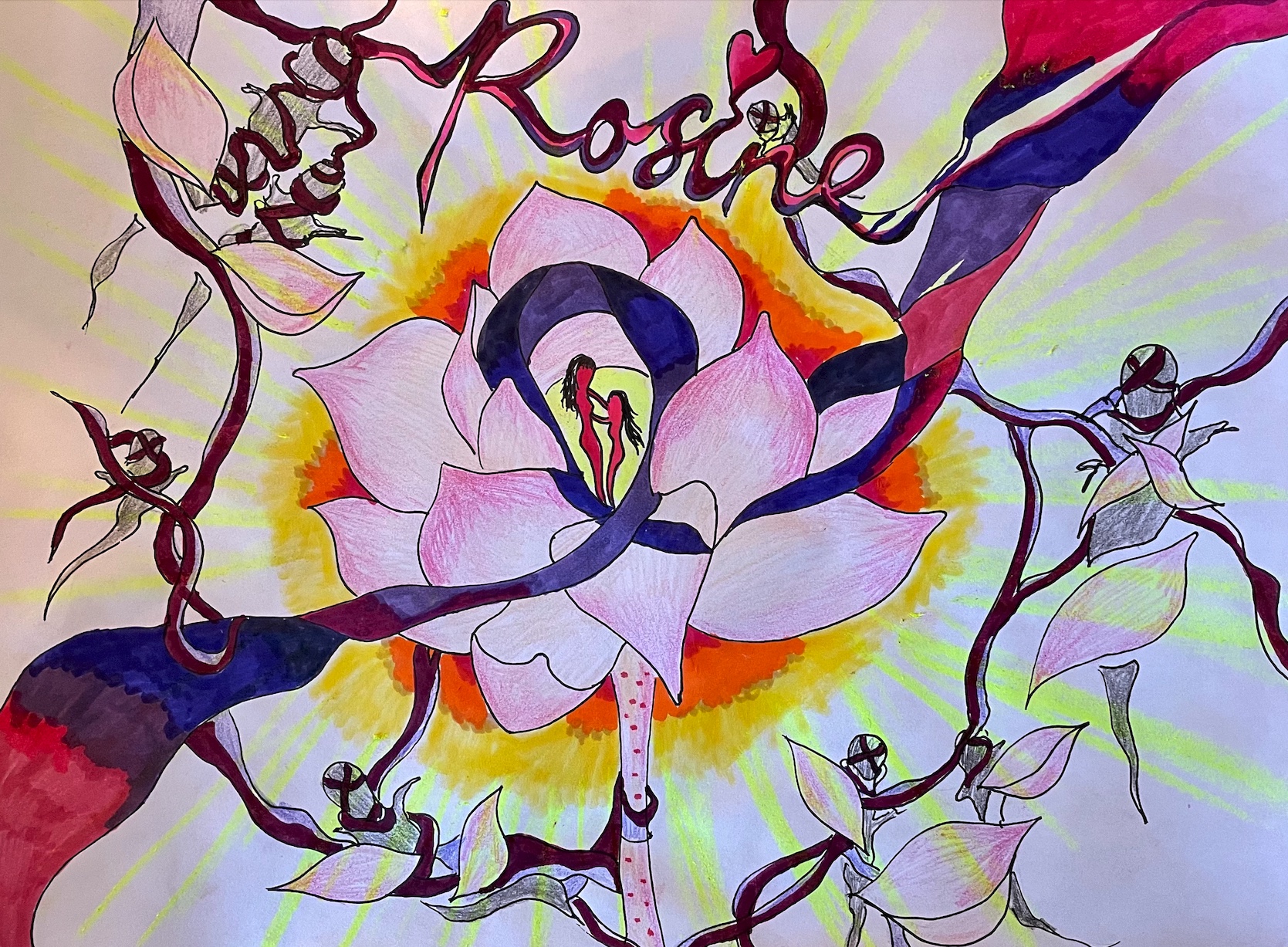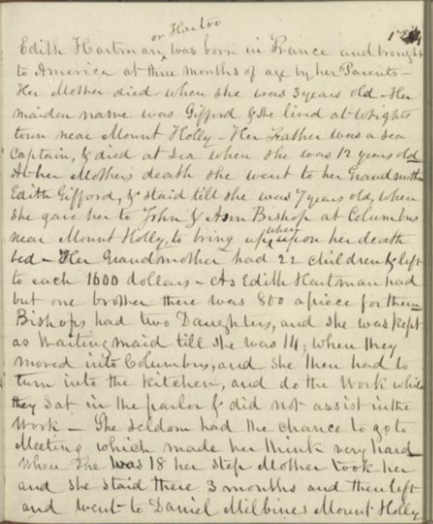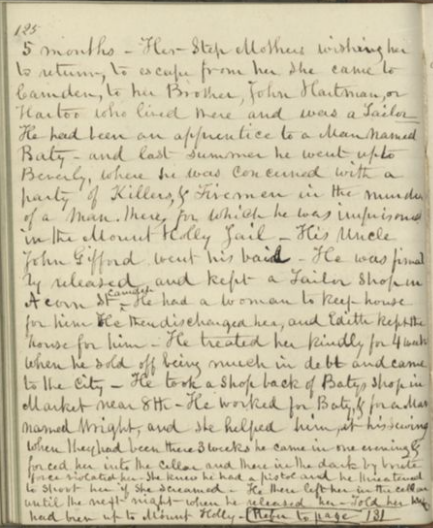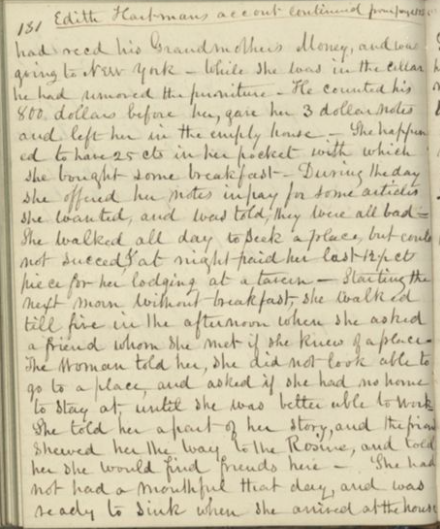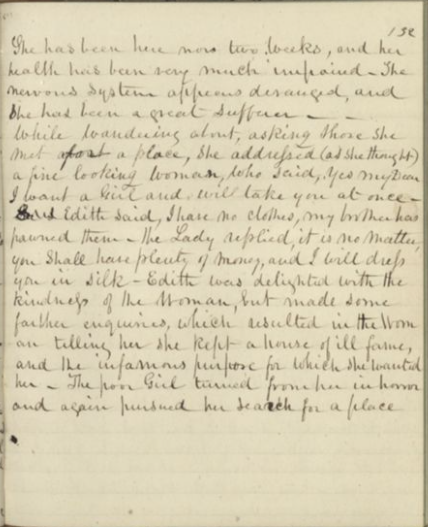By Vivian Guo
When I was reading Edith Hartman’s case file created by the Rosine Association, I tried to imagine myself in Edith’s shoes. She endured an arduous life and experienced many hardships that a lot of people today probably have never encountered.
Edith was born in France but moved to the United States when she was 3 months old. Her parents passed away when she was young, so she never had a stable home. She lived with her grandmother until she was 7 years old. When her grandmother’s health began to deteriorate, her grandmother sent her to John and Ann Bishop’s home, where Edith worked tirelessly as their maid for a couple of years. With all of the instability she faced, she had to work as a maid at a young age to sustain herself. When she was 18, she lived with her stepmother for a couple of months before moving to Mount Holly, New Jersey.1 After living in Mount Holly, NJ for 5 months, she moved to Camden, New Jersey to live with her brother, John Hartman, who was a tailor (Rosine Association Casebooks 2022, 125).
At first, the living conditions at John’s residence were adequate, as Edith felt calm and at peace with herself. However, the unexpected happened after a few weeks of living with her brother. John forced her to go to the basement, threatened to shoot her with a pistol if she screamed, and assaulted her. He left her in the cellar until the next night (Rosine Association Casebooks 2022, 125). He then took almost all of the money they had and left her to fend for herself (Rosine Association Casebooks 2022, 131).
Presumably, Edith did not press charges against her brother for battery. As a result, John Hartman never could get convicted for assault. However, the Rosine Association failed to mention why Edith didn’t press charges against John. Was she scared of the consequences it would result? It’s hard to see siblings or family members getting sentenced, even if they committed a crime on you. Did she think her brother would not be convicted for battery if she pressed charges against him?
In the 19th century, many prominent gender inequalities existed in the U.S prison system. When men were charged by women (especially black women) for assault, they were never convicted. For example, when Annie Mathews and Mary Walker pressed charges on 3 men for battery in 1900 at Philadelphia, PA, the court found the men “not guilty on other indictments charging felonious assault” despite the girls’ testimonies (Gross 2006, 75). On the other hand, when women were charged for battery, they were usually never convicted unless men testified against them (Manion 2015, 105). For instance, when Catherine Evenson was accused of assaulting George, Catherine, and Phebe Combs in 1823 at Philadelphia, PA, the court stood by the men who testified against Catherine, especially the testifiers “who failed to protect the women in their lives from the violence of another woman” (Manion 2015, 106).
These examples show how U.S prison systems in the 19th century prioritized enforcing gender roles to create an ideal American society over providing a safe environment for people, especially for women like Edith. Women who pressed charges against men for battery were not taken seriously by authorities because they were not “regarded as real women or ladies” (Gross 2006, 74). These women did not fit the ideal domestic role that society expected of women. By pressing charges against men for assault, they are being proactive, even though society tells them that they need to be submissive and compliant. However, men who testified against women accused of battery were taken seriously by authorities because the power they exuded when testifying against these women exhibited a characteristic that fit the ideal dominant role society expected of men (Manion 2015, 106). By testifying against women accused of assault, they are showing a take-charge attitude, which is what society wants them to do.
Because of the lack of protection these women receive from the prison systems, women either did not get the justice they deserved when they pressed charges against men for assault or did not even have the courage to press charges against these men. The women who did not press charges against the men who assaulted them chose to suffer in silence because they believed that the courts would not side with them. They downplayed their trauma and “closeted the pain” they experienced in their assault to “minimize their vulnerability” (Gross 2006, 76).
Edith Hartman’s case file is a primary example of the minimization of vulnerability seen in women who were assaulted by men. Instead of pressing charges against her brother, John, she searched for a place to stay (Rosine Association Casebooks 2022, 131). Finding a home was very difficult for Edith, as there were some people who tried to take advantage of her due to the vulnerable position she was in. For example, in her search for a home, she met a woman who she thought was offering her a wonderful home. However, she found out the woman was asking her to stay at a brothel, so she declined the offer (Rosine Association Casebooks 2022, 132). This situation occurs frequently among women like Edith because their vulnerability allows them to get lured into prostitution as a means to support themselves (Woloson 2015).
After being homeless for many days, she met another woman who suggested she should stay at the Rosine Association because she would be able to find friends at the Rosine. As a result, Edith moved into the Rosine Association. At the time Edith’s case file was written, she had only been at the Rosine for two weeks. However, her health had deteriorated in those two weeks (Rosine Association Casebooks 2022, 132).
Although Edith’s story didn’t have the happy ending that I hoped, it reveals the true purpose of policing and prison systems. Many people assume that the purpose of prison systems is to provide safety for citizens, but Edith’s case file proved otherwise. It shows that one of the purposes of prison systems is to create an ideal American society by enforcing gender roles. Edith’s decision not to press charges on her brother for assault shows how the prison system’s lack of care for assaulted women who pressed charges enforced a domestic and submissive role expected for women. Edith’s decision also indicates that she chooses to keep her pain to herself and suffer in silence. As a result, the prison system focuses more on creating the ideal America and less on keeping people like Edith safe.
__________
Footnotes
[1] Rosine Association Casebooks, 124
Bibliography
Gross, Kali N. Colored Amazons. Durham, NC: Duke University Press, 2006.
Manion, Jen. Liberty’s Prisoners: Carceral Culture in Early America. Philadelphia, PA: University of Pennsylvania Press, 2015.
Rosine Association (Philadelphia, Pa.), Rosine Association casebooks, Friends Historical Library of Swarthmore College, 2022, https://github.com/swat-ds/datasets/tree/main/rosine.
Rosine Association casebook, 1851-1858, Mira Sharpless Townsend Papers, In Her Own Right, Swarthmore College, 124-125, 131-132.
Woloson, Wendy. “Selling Sex.” Capitalism by Gaslight: The Shadow Economies of 19th-Century America (Selling Sex), 2015. https://librarycompany.org/shadoweconomy/section4.htm.
